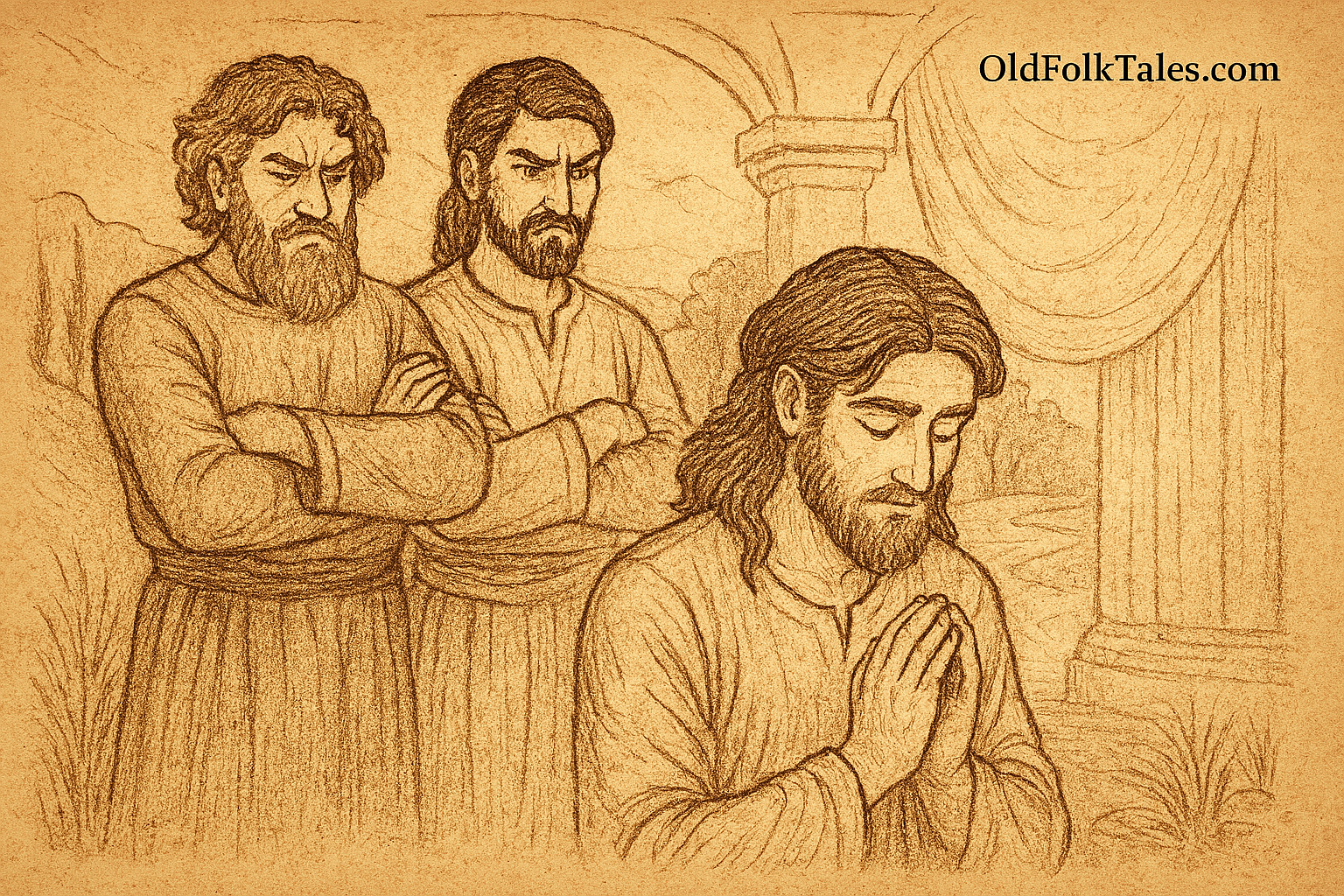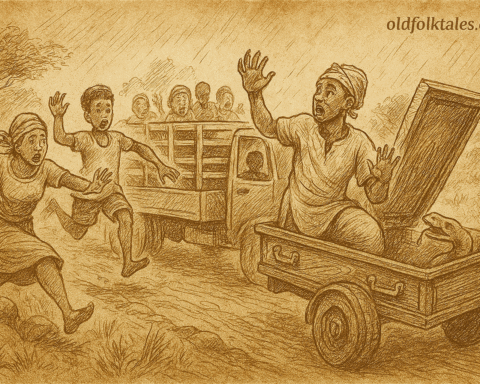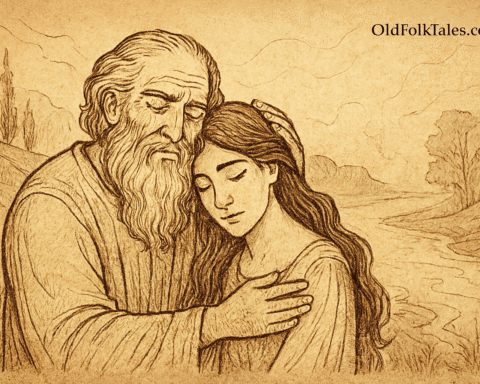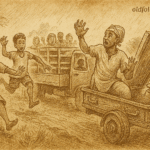In a magnificent kingdom where golden spires reached toward the heavens and marble halls echoed with the footsteps of nobility, there ruled a king whose heart carried a burden heavier than his jeweled crown. His palace, adorned with tapestries from distant lands and filled with treasures that sparkled like captured starlight, felt empty despite its grandeur. For all his wealth and power, the one thing he desired most remained beyond his grasp.
The king had taken two wives, each chosen for beauty that could stop armies in their tracks and inspire poets to weave verses of wonder. The first queen possessed hair like spun gold that caught the morning light, while the second had eyes as deep and mysterious as midnight pools. Yet beneath their stunning exteriors lay hearts as cold as winter stones and souls as sharp as polished blades. Their beauty was a mask that concealed cruelty, and their smiles hid intentions as twisted as thorny vines.
Years passed like leaves falling in autumn, and still no children blessed the royal house. The king’s advisors whispered in shadowed corners, and the people began to wonder if the kingdom would die with their ruler. In his desperation, the king summoned the wisest men in the land ancient scholars whose beards were white with knowledge and whose eyes held the depth of accumulated centuries.
Also read: The Sacred Promise
When these sages arrived at the palace, their robes rustling like autumn leaves, they studied the king with eyes that seemed to peer directly into his soul. After long contemplation and hushed consultation among themselves, their eldest spokesman stepped forward, his voice carrying the weight of prophecy.
“Your Majesty,” the old man said, his words falling like stones into still water, “you shall have no children until you marry a woman who is ugly in face but pure in spirit. Only when inner beauty dwells within your household will the blessing of heirs be granted.”
The king recoiled as if struck by lightning. How could he, ruler of the most beautiful kingdom in the known world, take an ugly wife? What would his nobles think? How would neighboring kingdoms regard such a choice? His pride warred with his desperate need for an heir, creating a storm within his royal breast.
But as months turned to years and his beautiful queens remained childless, the king’s resistance slowly crumbled like walls weathered by persistent rain. Finally, swallowing his vanity like bitter medicine, he sought out a woman whom others mocked for her plain features but whose reputation for kindness and wisdom had spread throughout the land.
This third queen possessed a face that would never inspire ballads or cause wars, but her eyes held warmth that could melt the coldest heart, and her hands brought comfort to all who suffered. When she smiled, something deeper than beauty shone through a radiance that came from a soul untainted by malice or greed.
True to the wise men’s prophecy, this humble woman soon blessed the king with three sons. The boys grew like young oaks in fertile soil strong of limb, bright of mind, and handsome enough to make the courtiers whisper that surely these princes combined the best of both beauty and character. The king’s joy knew no bounds, for his line was finally secured, and his kingdom would have worthy heirs.
But the two beautiful queens, rather than celebrating these miraculous births, nursed resentment that grew like poison in their hearts. They watched the plain queen’s sons with eyes green as serpents, their jealousy festering until it consumed any remaining goodness within them.
When the three princes reached manhood, tall and proud as their father, they announced their intention to venture forth into the world to seek their fortunes, as was the custom for royal sons. The king blessed their journey with heavy heart, knowing that such quests were necessary for princes to prove their worth, yet fearing what dangers awaited his beloved heirs.
The two elder brothers, born of the beautiful but cruel queens, had inherited more than their mothers’ striking features they had also absorbed their poison. As the brothers traveled the dusty roads that led away from the palace, jealousy gnawed at their hearts like hungry wolves. They observed how villagers and travelers naturally gravitated toward their youngest brother, drawn by his genuine kindness and generous spirit. They noticed how his laughter brought smiles to weathered faces, and how his gentle words could calm the most troubled hearts.
This goodness, which should have made them proud, instead filled them with venomous envy. How dare this son of an ugly woman win more love than they, who possessed royal beauty and noble bearing? Their resentment grew with each passing day, fed by whispered conversations and meaningful glances shared between them.
As they journeyed through increasingly remote lands, where the roads grew narrow and the forests deep, the elder brothers’ cruelty finally erupted like a volcano long dormant. They fell upon their youngest sibling with fists and harsh words, beating him until his noble features were bruised and bloodied. When their rage was spent, they dragged his broken body to the roadside and left him there like discarded refuse, telling themselves he was surely too weak to survive.
The youngest prince lay motionless as death approached on silent wings, his breath coming in shallow gasps while pain coursed through his body like liquid fire. Above him stretched the vast canvas of sky, painted with clouds that drifted like ships on an azure sea. The silence was profound, broken only by the whisper of wind through grass and the distant call of birds.
Then, cutting through the peaceful quiet, came harsh voices that seemed to descend from the heavens themselves. The prince’s eyes, swollen nearly shut, managed to track the source a parliament of vultures circling overhead, their black wings casting moving shadows on the earth below.
To his amazement, their cries formed words that his pain-clouded mind could somehow understand, as if his brush with death had opened doors to secret knowledge. The great birds spoke to one another in their ancient tongue, unaware that mortal ears could comprehend their conversation.
“Sister,” called one vulture to another, her voice like wind through dry bones, “do you remember the treasure cave hidden in the eastern mountains? The one sealed by magic words that only we know?”
“Indeed,” replied her companion, banking on a thermal wind, “and do not forget the healing spring in the western valley. Its waters can cure any wound, restore any strength, but mortals fear to drink from it, believing it cursed.”
The youngest prince’s heart, though weak, leaped with sudden hope. When the vultures finally departed, riding air currents toward distant hunting grounds, he summoned every fragment of remaining strength and began to crawl. Each movement sent lightning bolts of agony through his broken body, but determination drove him forward like an invisible hand.
Following the vultures’ directions, he found the hidden spring nestled in a valley where wildflowers bloomed in impossible profusion. The water bubbled up from deep earth, crystal clear and singing with an otherworldly music. Despite his fear, the prince cupped the precious liquid in his trembling hands and drank deeply.
Instantly, warmth flooded through his veins like liquid sunlight. Cuts healed without scars, bruises faded like morning mist, and strength returned to his limbs as if he had never been harmed. More than that, he felt a clarity of mind and purpose that seemed to shine from within.
Renewed and filled with wonder, he sought the treasure cave the vultures had described. High in the mountain peaks, behind a boulder that seemed unmovable by human hands, he found the secret entrance. Speaking the magical words he had overheard, he watched in awe as the great stone rolled aside like a door opening to paradise.
Within lay riches beyond the dreams of kings gold that gleamed like captured sunshine, jewels that held rainbow fire, and artifacts crafted by hands long turned to dust. But more valuable than any treasure was the knowledge that kindness and patience had led him to this moment of triumph.
From that day forward, the youngest prince lived not as a victim of his brothers’ cruelty, but as a man blessed by wisdom and abundance. His cruel siblings, believing him dead, continued their journey in ignorance, never knowing that their evil had ultimately served to elevate the very brother they had tried to destroy.
The Moral Lesson
This timeless tale teaches us that true treasure comes to those who endure hardship with patience and maintain their goodness despite suffering cruelty. The youngest prince’s ability to listen when others could not, and his courage to act on wisdom received in unexpected ways, transformed his greatest trial into his greatest triumph. Meanwhile, his brothers’ envy and cruelty ultimately cost them the very fortune they might have shared, proving that evil intentions often harm their perpetrators more than their intended victims.
Knowledge Check
Q1: Why couldn’t the king have children with his first two beautiful wives? A: According to the wise men’s prophecy, the king could have no children until he married “a woman who is ugly in face but pure in spirit.” Only when inner beauty entered his household would heirs be granted.
Q2: What motivated the two elder brothers to attack and abandon their youngest sibling? A: The elder brothers were consumed with jealousy because people naturally loved and respected their youngest brother for his goodness and kind spirit, despite his mother being considered plain. Their envy grew until it erupted into violent cruelty.
Q3: How was the youngest prince able to understand the vultures’ conversation? A: The story suggests that his near-death experience opened doors to secret knowledge, allowing him to comprehend the vultures’ ancient tongue and learn about the healing spring and treasure cave from their conversation.
Q4: What two magical discoveries did the vultures reveal to the youngest prince? A: The vultures revealed the location of a healing spring whose waters could cure any wound and restore strength, and a treasure cave in the mountains that could only be opened with magical words that the vultures guarded.
Q5: What does the contrast between the beautiful queens and the plain queen symbolize? A: This contrast symbolizes the difference between superficial, external beauty and true inner beauty. The story teaches that genuine worth comes from character, kindness, and purity of spirit rather than physical appearance.
Q6: What is the main lesson about justice and reward in this traditional story? A: The story demonstrates divine justice that goodness and patience in the face of suffering are ultimately rewarded, while cruelty and envy lead to loss and emptiness. Those who maintain their integrity despite hardship receive unexpected blessings.
Source: retold from The Multicolored diary






